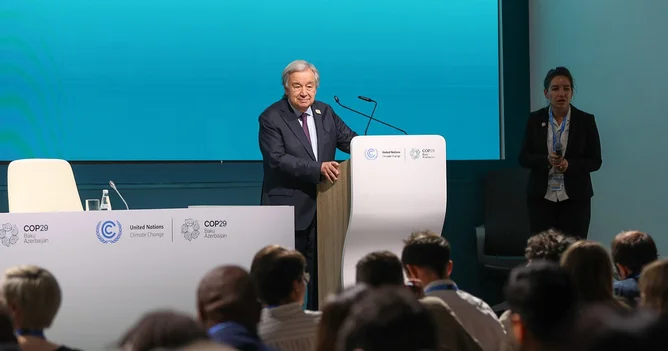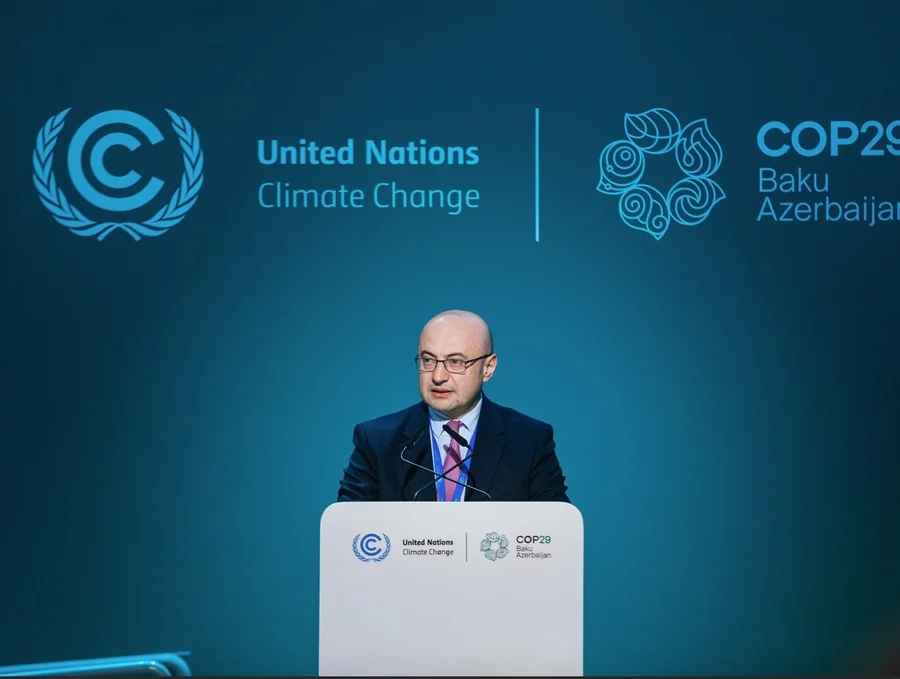Elmar Mammadov, Co-Leader of the COP29 Presidency Action Agenda Team on the Baku Initiative for Climate Finance, Investment & Trade (BICFIT) Dialogue.
Elmar Mammadov, Co-Leader of the COP29 Presidency Action Agenda Global and Regional Initiatives Team, Head of Economic Cooperation Department of the Ministry of Foreign Affairs of the Republic of Azerbaijan shares how the newly established Baku Initiative for Climate Finance, Investment, and Trade (BICFIT) Dialogue aims to ensure that this nexus is fully embedded in national climate policies and development plans.
As Co-Leader of the COP29 Presidency Action Agenda Global and Regional Initiatives Team, Elmar plays a pivotal role in driving global and regional strategies to address pressing climate challenges at the COP29.
A seasoned diplomat, his career began in 2001 with the Ministry of Foreign Affairs, where he represented Azerbaijan at the UN in Geneva and in its Embassies in Switzerland and France. From 2017 to 2024, he served as a senior adviser in the Administration of the President of the Republic of Azerbaijan, leading efforts to advance the green agenda.
Currently, he also heads the economic cooperation department at the Ministry of Foreign Affairs, blending economic diplomacy, innovation and sustainability to foster impactful initiatives.
He shares his on-the-ground insights about COP29’s newly launched BICFIT Dialogue with us.
What is BICFIT Dialogue, and why was it launched?
Achieving the objectives and goals of the United Nations Framework Convention on Climate Change (UNFCCC) and Paris Agreement requires a fundamental transformation in how we consider the role of finance, investment and trade in our efforts to mitigate and adapt to climate change.
The BICFIT Dialogue was officially launched on 14th of November 2024, during the first thematic day of COP29, the inaugural Finance, Investment and Trade Day.
“We have the urgent need for global, cohesive action to address the intersectional challenges of climate change and sustainable development.”
Today, we have the urgent need for global, cohesive action to address the intersectional challenges of climate change and sustainable development, as well as the unique role of climate finance, investment, and trade in enabling just and inclusive transition to low-carbon economies.
The role of finance, investment and trade in addressing climate change has become an increasingly critical consideration in recent years. And these topics have been in focus starting from COP22 and at recent COP conferences namely COP26, COP27 and COP28.
With climate finance at the heart of our agenda in Baku, the COP29 Presidency was determined to maintain and build upon this momentum. A new platform for global stakeholders in climate, development and trade, BICFIT Dialogue aims to enhance the connection between finance, investment and trade, and sustainable development.
Recently endorsed by Parties and non-Party stakeholders as UN agencies, international organisations, multilateral development banks, multilateral climate funds and thinks tanks, BICFIT Dialogue was established to ensure continuity of discussion, actions and initiatives by active involvement of previous, present and future COPs, placing finance, investment, trade and sustainable development at the centre of the climate agenda.
How will the BICFIT Dialogue support countries in attracting climate-positive investments?
By aligning finance, investment and trade, BICFIT Dialogue empowers stakeholders and provides them with a regular platform and dialogue to collaborate effectively and enhance their collective impact. This approach will support climate action and will help ensure that climate and development objectives are mutually reinforcing.
Once BICFIT Dialogue is operationalised, it will encourage investment promotion institutions to attract climate-positive investments and support the design, structuring, and preparation of concrete, bankable climate projects.
By encouraging the creation of national, regional, and sub-regional platforms, BICFIT Dialogue also seeks to align climate action with development objectives at more localised levels, ensuring that investments align with sustainable development goals and contribute positively to climate objectives.
What role will it play in global trade and climate policy?
BICFIT Dialogue aims to enhance the integration of climate finance, investment, and trade by providing a space for dialogue and cooperation among global stakeholders. It will ensure that these crucial areas are embedded in national climate policies, promoting a coherent approach to addressing climate challenges.

The BICFIT Dialogue will serve as a global platform which could bring together key coalitions and stakeholders such as the Coalition of Finance Ministers for Climate Action, the Coalition of Trade Ministers on Climate, the Climate FDI Coalition, the newly initiated Baku Global Coalition for SMEs Green Transition, as well as the Glasgow Financial Alliance for Net Zero (GFANZ) to align climate finance, investment, and trade with sustainable development priorities, including by building partnerships and fostering innovation. In doing so, the initiative builds on its prominence of the topics of finance, development, investment and trade at COP22, COP26, COP27, and COP28 and aims to leave a legacy of climate resilience, sustainable growth, and socio-economic well-being for future generations.
Additionally, BICFIT Dialogue will organise regular dialogues as part of the biannual UN Trade and Development (UNCTAD) World Investment Forum and other global platforms, fostering collaboration and the exchange of best practices.
BICFIT Dialogue also envisages the establishment of five key pillars to guide its efforts and address critical areas.
The five pillars include:
- Enhancing access to and effectiveness of climate finance;
- Attracting sustainable foreign direct investment (FDI) for climate resilience and low-carbon growth;
- Empowering micro, small, and medium enterprises (MSMEs) in green and just transition;
- Advancing knowledge-sharing and enhancing human capital for integrated climate and development ambitions;
- Establishing regular BICFIT Dialogue Conferences to sustain global momentum.
How is the BICFIT Dialogue connected to the COP29 Presidency and other international institutions?
In creating the BICFIT Dialogue, the COP29 Presidency has brought together past and future COP Presidencies, UNCTAD, UNDP, World Trade Organization (WTO) Secretariat, International Trade Center (ITC), multilateral development banks, multilateral climate funds, including the Green Climate Fund.
BICFIT Dialogue will facilitate global coherence between the UNFCCC, global climate, trade and development processes, aligning climate finance, investment, and trade with national development strategies and voluntary efforts under the UNFCCC and the Paris Agreement.
During Finance, Investment and Trade Day, the COP29 Presidency also created a platform for global engagement and cooperation through the Trade and Investment House, which was located in the Blue and Green Zones of COP29.



